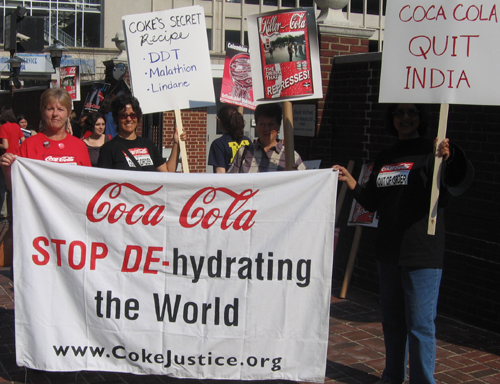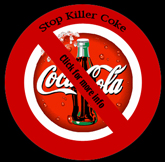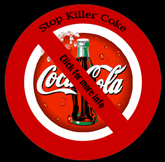From the Open-Publishing Calendar
From the Open-Publishing Newswire
Indybay Feature
International campaign against Killer Coke intensifies
A formidable progressive movement against the Coca-Cola companies’ labor and human rights violations in Colombia and elsewhere continues building in the United States, Canada and many other countries.

International campaign against Killer Coke intensifies
By Bryan G. Pfeifer
A formidable progressive movement against the Coca-Cola companies’ labor and human rights violations in Colombia and elsewhere continues building in the United States, Canada and many other countries.
The Student Coalition to Cut the Coca-Cola Contract, a coalition of over 20 organizations representing 5,000 students at the University of Michigan dealt the latest blow to the multi-billion dollar corporation.
The Atlanta-based Coca-Cola markets four of the world's top five soft-drink brands: Coke, Diet Coke, Fanta and Sprite. Founded in 1886, it has operations in more than 200 countries producing nearly 400 beverage brands including Dannon, Dasani, Minute Maid and Nestea.
In a June 20 press release, the coalition announced that the university has placed Coke “on probation” until August 2006 for the corporation’s actions in Colombia and India.
“The students at Michigan have secured a significant victory for the people of India and Colombia. Their actions have paved the way for other colleges and universities to join the growing number of campuses applying pressure on the Coca-Cola company,” said Amit Srivastava of The India Resource Center at the U of Michigan, a leading member of the student coalition (http://www.IndiaResource.org).
The university's concession came only after a massive months-long campaign at various U of Michigan campuses. Actions included two public hearings at the university at which Sinaltrainal representatives, a Colombian trade union at Coke plants there, the United Steelworkers and the United Students Against Sweatshops participated.
Sinaltrainal is asking supporters to boycott all Coke products.
After a 10-month investigation by a university Dispute Review Board, an advisory body created by the university under pressure from the student coalition, Coke was found guilty of violating the U of Michigan’s Vender Code of Conduct. This decision was based on scientific proof of high pesticide levels in Coke soft drinks in India and the corporation’s repeated violations of labor laws in Colombia according to the DRB.
Coke has been selling products in India with high levels of pesticides, including DDT, sometimes as high as 30 times those allowed by the U.S. and E.U. standards. On May 19, 2005 a shipment of Coke products made in India and shipped to the U.S. were barred from entering the U.S. by the Food and Drug Administration, on the grounds that they were “unsafe” and “not conforming to U.S. laws.”
The board said it would further assess the issues of Coke depleting groundwater and disposing of its toxic waste as fertilizer to farmers around its plants in India.
The DRB ordered Coke to submit in writing by September 30, 2005 to a third party, independent investigation regarding its corporate practices in India and Colombia with an audit to be completed by March 31, 2006. Coke is then supposed to adhere to a corrective action plan to be in place by May 31, 2006.
Furthermore, the university has renewed its contract with Coke on a conditional three-month basis only beginning in June 2005 pending satisfactory actions from the corporation.
The DRB further states that if Coke doesn’t meet these deadlines and satisfactory progress isn’t made, “the University business relationship with Coca-Cola shall be suspended and Coca-Cola products shall not be offered at the University, which includes but is not limited to vending, food service operations, athletic events and University-catered events.”
Killer Coke’s history
In the U.S. Coke has a history of discriminating against African Americans. In June, 2000 the corporation settled a class-action lawsuit with over 1,500 Black workers based on massive evidence of unequal pay, biased promotions, a racially hostile work environment and retaliation against workers who aired grievances, according to the book “War in Colombia: Made In U.S.A.,” (http://www.leftbooks.com).
In Colombia, Coke’s main Latin American bottler, Panamco, is charged with hiring right-wing paramilitaries to assassinate and terrorize trade union leaders, their loved ones and their communities (http://www.killercoke.org).
Since 1989, at least eight trade union leaders from Coke’s bottling plants in Colombia have been killed by paramilitary forces. Coke and Panamco are being sued in the U.S. by the United Steelworkers under the Alien Claims Tort Act for having “contracted with or otherwise directed paramilitary security forces that used extreme violence and murdered, tortured, and unlawfully detained trade union leaders,” (http://www.uswa.org).
More than 3,000 trade unionists have been assassinated in Colombia since 1990. In the recent period, many U.S-based corporations and the imperialist government, mostly through Plan Colombia, work hand-in-glove with the Colombian government and ruling class to perpetuate this terrorism.
Some 63 percent of the people of Colombia live in poverty -- 25 percent in abject misery.
But despite this, international unity and solidarity with Colombian unions is building rapidly.
*According to the 525,000 member New York State United Teachers union, an American Federation of Teachers affiliate, the union’s Representative Assembly in April adopted a resolution to refrain from serving or selling Coke products at its offices, events or meetings (http://www.nysut.org).
*Federations, Labor councils, and unions across the United States in recent months have passed scores of resolutions to protest Coke’s labor and human rights violations, banning Coke machines and products from union halls, and demanding schools remove Coke machines. The unions include various locals of the American Postal Workers Union, California Federation of Teachers, the Communication Workers of America, SEIU, the UAW, Union of Clerical and Technical Workers at NYU, and the United Steel Workers. Many Canadian and U.K. locals have passed similar resolutions (http://www.killercoke.org).
*After massive student pressure, Rutgers University in New Jersey didn’t renew Coke’s exclusive beverage contract, effective June 1, 2005. In the U.S. and U.K. active campaigns to ban Coke are now underway at over 30 campuses.
* At an “International Campaign to Hold Coca-Cola Accountable” workshop held at the World Social Forum at Porto Alegre, Brazil in January, 2005, over 500 activists attended to learn about ways to protest Killer Coke and support Colombian trade unionists (http://www.iacenter.org).
*The Coca-Cola Co. provided $1,200 to bring poet Martin Espada to Kansas University in Lawrence, Kansas March 10. When Espada learned of Coke’s actions he decided to donate the money to Sinaltrainal.
Espada, a renowned Latino poet who has published seven collections and a University of Massachusetts at Amherst English professor, said upon reaching the podium: “Until the disturbing questions about Coke's labor record in Colombia have been answered, I cannot in good conscience accept monies from Coca-Cola or have my name associated with the company,” (http://www.ljworld.com).
Internationalism the way forward
Motisola Abdallah, an African American woman and one of the original four plaintiffs who brought the discrimination lawsuit against Coke in 1999, sums up the Killer Coke struggle.
“I’m happy that the struggle against Coca-Cola is long-term and global. It proves that workers wherever they live are all in this together. A corporation like Coca-Cola isn’t just unfair to its workers in one place. Injustice runs throughout a business where profit is the driving motivation,” said Abdallah in “War in Colombia…”
“Anyone fighting for justice can’t give up. Together we can bring change, real harmony, real justice.”
-- 30 --
(c) 2005 Bryan G. Pfeifer. Article may be used in full or in part provided full attribution is given to author.
Labor donated.
By Bryan G. Pfeifer
A formidable progressive movement against the Coca-Cola companies’ labor and human rights violations in Colombia and elsewhere continues building in the United States, Canada and many other countries.
The Student Coalition to Cut the Coca-Cola Contract, a coalition of over 20 organizations representing 5,000 students at the University of Michigan dealt the latest blow to the multi-billion dollar corporation.
The Atlanta-based Coca-Cola markets four of the world's top five soft-drink brands: Coke, Diet Coke, Fanta and Sprite. Founded in 1886, it has operations in more than 200 countries producing nearly 400 beverage brands including Dannon, Dasani, Minute Maid and Nestea.
In a June 20 press release, the coalition announced that the university has placed Coke “on probation” until August 2006 for the corporation’s actions in Colombia and India.
“The students at Michigan have secured a significant victory for the people of India and Colombia. Their actions have paved the way for other colleges and universities to join the growing number of campuses applying pressure on the Coca-Cola company,” said Amit Srivastava of The India Resource Center at the U of Michigan, a leading member of the student coalition (http://www.IndiaResource.org).
The university's concession came only after a massive months-long campaign at various U of Michigan campuses. Actions included two public hearings at the university at which Sinaltrainal representatives, a Colombian trade union at Coke plants there, the United Steelworkers and the United Students Against Sweatshops participated.
Sinaltrainal is asking supporters to boycott all Coke products.
After a 10-month investigation by a university Dispute Review Board, an advisory body created by the university under pressure from the student coalition, Coke was found guilty of violating the U of Michigan’s Vender Code of Conduct. This decision was based on scientific proof of high pesticide levels in Coke soft drinks in India and the corporation’s repeated violations of labor laws in Colombia according to the DRB.
Coke has been selling products in India with high levels of pesticides, including DDT, sometimes as high as 30 times those allowed by the U.S. and E.U. standards. On May 19, 2005 a shipment of Coke products made in India and shipped to the U.S. were barred from entering the U.S. by the Food and Drug Administration, on the grounds that they were “unsafe” and “not conforming to U.S. laws.”
The board said it would further assess the issues of Coke depleting groundwater and disposing of its toxic waste as fertilizer to farmers around its plants in India.
The DRB ordered Coke to submit in writing by September 30, 2005 to a third party, independent investigation regarding its corporate practices in India and Colombia with an audit to be completed by March 31, 2006. Coke is then supposed to adhere to a corrective action plan to be in place by May 31, 2006.
Furthermore, the university has renewed its contract with Coke on a conditional three-month basis only beginning in June 2005 pending satisfactory actions from the corporation.
The DRB further states that if Coke doesn’t meet these deadlines and satisfactory progress isn’t made, “the University business relationship with Coca-Cola shall be suspended and Coca-Cola products shall not be offered at the University, which includes but is not limited to vending, food service operations, athletic events and University-catered events.”
Killer Coke’s history
In the U.S. Coke has a history of discriminating against African Americans. In June, 2000 the corporation settled a class-action lawsuit with over 1,500 Black workers based on massive evidence of unequal pay, biased promotions, a racially hostile work environment and retaliation against workers who aired grievances, according to the book “War in Colombia: Made In U.S.A.,” (http://www.leftbooks.com).
In Colombia, Coke’s main Latin American bottler, Panamco, is charged with hiring right-wing paramilitaries to assassinate and terrorize trade union leaders, their loved ones and their communities (http://www.killercoke.org).
Since 1989, at least eight trade union leaders from Coke’s bottling plants in Colombia have been killed by paramilitary forces. Coke and Panamco are being sued in the U.S. by the United Steelworkers under the Alien Claims Tort Act for having “contracted with or otherwise directed paramilitary security forces that used extreme violence and murdered, tortured, and unlawfully detained trade union leaders,” (http://www.uswa.org).
More than 3,000 trade unionists have been assassinated in Colombia since 1990. In the recent period, many U.S-based corporations and the imperialist government, mostly through Plan Colombia, work hand-in-glove with the Colombian government and ruling class to perpetuate this terrorism.
Some 63 percent of the people of Colombia live in poverty -- 25 percent in abject misery.
But despite this, international unity and solidarity with Colombian unions is building rapidly.
*According to the 525,000 member New York State United Teachers union, an American Federation of Teachers affiliate, the union’s Representative Assembly in April adopted a resolution to refrain from serving or selling Coke products at its offices, events or meetings (http://www.nysut.org).
*Federations, Labor councils, and unions across the United States in recent months have passed scores of resolutions to protest Coke’s labor and human rights violations, banning Coke machines and products from union halls, and demanding schools remove Coke machines. The unions include various locals of the American Postal Workers Union, California Federation of Teachers, the Communication Workers of America, SEIU, the UAW, Union of Clerical and Technical Workers at NYU, and the United Steel Workers. Many Canadian and U.K. locals have passed similar resolutions (http://www.killercoke.org).
*After massive student pressure, Rutgers University in New Jersey didn’t renew Coke’s exclusive beverage contract, effective June 1, 2005. In the U.S. and U.K. active campaigns to ban Coke are now underway at over 30 campuses.
* At an “International Campaign to Hold Coca-Cola Accountable” workshop held at the World Social Forum at Porto Alegre, Brazil in January, 2005, over 500 activists attended to learn about ways to protest Killer Coke and support Colombian trade unionists (http://www.iacenter.org).
*The Coca-Cola Co. provided $1,200 to bring poet Martin Espada to Kansas University in Lawrence, Kansas March 10. When Espada learned of Coke’s actions he decided to donate the money to Sinaltrainal.
Espada, a renowned Latino poet who has published seven collections and a University of Massachusetts at Amherst English professor, said upon reaching the podium: “Until the disturbing questions about Coke's labor record in Colombia have been answered, I cannot in good conscience accept monies from Coca-Cola or have my name associated with the company,” (http://www.ljworld.com).
Internationalism the way forward
Motisola Abdallah, an African American woman and one of the original four plaintiffs who brought the discrimination lawsuit against Coke in 1999, sums up the Killer Coke struggle.
“I’m happy that the struggle against Coca-Cola is long-term and global. It proves that workers wherever they live are all in this together. A corporation like Coca-Cola isn’t just unfair to its workers in one place. Injustice runs throughout a business where profit is the driving motivation,” said Abdallah in “War in Colombia…”
“Anyone fighting for justice can’t give up. Together we can bring change, real harmony, real justice.”
-- 30 --
(c) 2005 Bryan G. Pfeifer. Article may be used in full or in part provided full attribution is given to author.
Labor donated.


Add Your Comments
Comments
(Hide Comments)
Down with KILLER-KOLAs!!!
This message has been brought to you by Mecca Cola...
"Enjoy a taste of Jihad"
"Enjoy a taste of Jihad"
Hebrola...the drink for all zionist assasins on the go. Have two!! There's propaganda to disseminate!
We are 100% volunteer and depend on your participation to sustain our efforts!
Get Involved
If you'd like to help with maintaining or developing the website, contact us.
Publish
Publish your stories and upcoming events on Indybay.
Topics
More
Search Indybay's Archives
Advanced Search
►
▼
IMC Network


